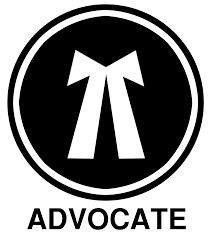advocate
英 [ˈæd.və.keɪt]
美 [ˈæd.və.keɪt]
- vt. 提倡,主张,拥护
- n. 提倡者;支持者;律师
使用频率:

记忆方法
将“advocate”分解为“ad”和“vocate”。想象自己(“ad”)站在一个高高的舞台上(“vocate”可以看作是“voice”的谐音),大声地(“voice”发声)倡导(“advocate”)某个理念或事业。这个场景可以帮助记忆单词的含义。
以上内容由AI生成, 仅供参考和借鉴
中文词源
advocate 倡导
ad-,去,往,-voc,说,词源同voice.
英语词源
- advocate
-
advocate: [14] Etymologically, advocate contains the notion of ‘calling’, specifically of calling someone in for advice or as a witness. This was the meaning of the Latin verb advocāre (formed from vocāre ‘call’, from which English also gets vocation). Its past participle, advocātus, came to be used as a noun, originally meaning ‘legal witness or adviser’, and later ‘attorney’.
In Old French this became avocat, the form in which English borrowed it; it was later relatinized to advocate. The verb advocate does not appear until the 17th century. The word was also borrowed into Dutch, as advocaat, and the compound advocaatenborrel, literally ‘lawyer’s drink’, has, by shortening, given English the name for a sweetish yellow concoction of eggs and brandy.
=> invoke, revoke, vocation - advocate (n.)
- mid-14c., "one whose profession is to plead cases in a court of justice," a technical term from Roman law, from Old French avocat "barrister, advocate, spokesman," from Latin advocatus "one called to aid; a pleader, advocate," noun use of past participle of advocare "to call" (as witness or advisor) from ad- "to" (see ad-) + vocare "to call," related to vocem (see voice (n.)). Also in Middle English as "one who intercedes for another," and "protector, champion, patron." Feminine forms advocatess, advocatrice were in use in 15c.
- advocate (v.)
- 1640s, from advocate (n.). Related: Advocated; advocating; advocation.
权威例句
- 1. He is a keen advocate of park-and-ride schemes.
- 他是“停车再换乘”计划的热情拥护者。
- 2. The group does not advocate the use of violence.
- 该团体不支持使用暴力。
- 3. Often the interviewer will need to play devil's advocate in order to get a discussion going.
- 采访者常常需要故意唱唱反调以使访谈继续下去。
- 4. He is a strident advocate of nuclear power.
- 他是发展核能的坚定拥护者。
- 5. He got the best advocate in town to defend him.
- 他请城里最好的律师为他辩护.
